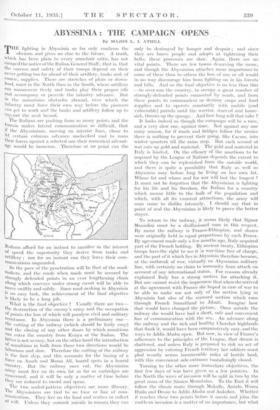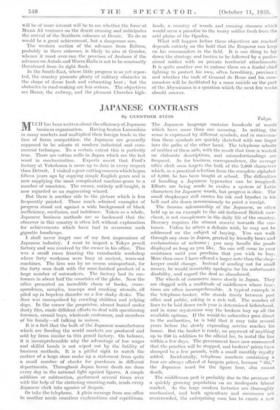ABYSSINIA : THE CAMPAIGN OPENS
By MAJOR L. I. ATHILL Tobvious and gives no clue to the future. A truth, HE fighting in Abyssinia so far only confirms the Which has been plain to every armchair critic, has not escaped the notice of the Italian General Staff ; that is, that the success and safety of their troops depend on their never getting too far ahead of their artillery, tanks and, of course, supplies. There are stretches of plain or down- land, rarer in the North than in the South, where artillery Can manoeuvre freely and tanks play their proper role and accompany or precede the infantry advance. But in the mountains obstacles abound, over which the infantry must force their own way before the pioneers Can get to work and the tanks and artillery follow up to Enp)ort the next bound.
The Italians are pushing from so many points and the terrain makes lateral communication so difficult, that if the Abyssinians, moving on interior lines, chose to let certain columns advance unchecked and to mass their forces against a selected one their numerical advant- age would be immense. Therefore at no point can the Italians afford for an instant to sacrifice in the interest of speed the superiority they derive from tanks and artillery ; nor for an instant can they leave 'their com- tnunieations unguarded. SO the pace of the penetration will be that of the road- niakers, and the roads when made must be secured by strongly defended points in an ever lengthening chain along which convoys under strong escort will be able to Inoye swiftly and safely. Since road-making in Abyssinia is no easy task, the achievement of the final objective is likely to be a long job. What is the final objective ? Usually there are two— the destruction of the enemy's army and the occupation of Points the loss of which will paralyse civil and military resistance. In Abyssinia there is a preliminary one— the cutting of the railway (which should be fairly easy) and the closing of any other doors by which munitions can enter the country from Kenya or the Sudan. The latter is not so easy, but on the other hand the introduction of munitions in bulk from these two directions would be laborious and slow. Therefore the cutting of the railway is the first step, and this accounts for the ba'sing of a force on Assab and Mussa Ali, horrid spots in a horrid country. But the railway once cut, the Abyssinian army must live on its own fat as far as cartridges are concerned, and it will be only a matter of time befo're they are reduced to sword and spear. The two sealed-pattern .objectives arc, More illusory. The Abyssinians are tied to no base or line of com- munication. They live on the land and scatter or collect at will. Unless they commit suicide in masses they can only be 'destroyed by hunger' and despair ; and since they are brave people and adepts at tightening their belts, these processes are slow: Again, there are no vital points.. There are few towns deserving the name, and though the Abyssinian attaches more importance to some of these than to others the loss of one or all would in no way discourage him from fighting on in his forests and hills. And so the final objective is no less than this —to over-run the country, to occupy a great number of strongly-defended points connected by roads, and from these points to commandeer or destroy crops and food iopplies and to operate constantly with mobile (and vulnerable) patrols until the warrior, starved and home- sick, throws up the sponge. And how long will that take ? It looks indeed as though the campaign will be a race, and ,a very slow one, against time. Not against any one rainy season, for if roads and bridges follow the armies there is nothing to prevent their going, like Caesar, into winter quarters till the rains stop. But each second of war eats up gold and material. The gold and material in Italy is limited. On the efficacy of the sanctions to be imposed by the League of Nations depends the extent to which they can be replenished from the outside world, and there is quite a possibility that Italy as well as Abyssinia may before Tong be living on her own fat. Whose fat and whose zeal for war will last the longest ? It must not be forgotten that the Abyssinian is fighting for his life and his freedom, the Italian for a country which means little to the bulk of the population and which, with all its vaunted attractions, the army will soon come to dislike intensely. I should say that in point Of zeal the Abyssinian is likely to prove the better stayer. .,.
To return to the railway, it seems likely that Signor Mussolini must be a disillusioned man in this respect. By name the railway is Franco-Ethiopian, and shares were originally held in equal proportions by each Power. • By agreement made only a few months ago, Italy acquired part of the French holding. By ancient treaty, Ethiopian troops have the right to use it in war-time free of charge, and the part of it which lies in Abyssinia therefore became, at the outbreak of war, virtually an Abyssinian military line, with certainly no claim to immunity from attack on account of any international status. For reasons already explained Italy has a strong motive for attacking it. But one cannot resist the impression that when she arrived at the agreement with France she hoped in case of war to be able to make use not only of the section lying in Abyssinia but also of the seaward section which runs through French Somaliland to Jibuti. Imagine how that would have changed the picture. Once astride the railway she would have had a short, safe and convenient line of communication with the sea. An advance along the railway and the rich and healthy Chercher highlands that flank it, would have been comparatively easy, and the ways to Addis Ababa open. But now, in view of France's adherence to the principles of the League, that dream is shattered, and 'unless Italy is prepared to risk an act of aggression by entering French territory her soldiers must plod wearily across innumerable miles of hoStile land, with this convenient side-entrance tantalisingly eloSed. '
Turning to the' Other more immediate objectives, the first few day's 'of War have given us a few pointers. In the North the wave of invasion will be split in two by the great mass of the Simien Mountains. To the East it will follow the classic route through Makalle,' Antalo, WOrra IJailu and Bessie to Addis Ababa and Ankober. Whether it reaches these two Points before it meets and j6ins the southern invasion is a matter of no importance, but what will, be of more interest will be to see whether the force. at MussyAli ventures on'the desert crossing and anticipates the arrival of the Northern columns at Dessie. To do so would be a great achievement, but a dangerous one. The western section of the advance from Eritrea, probably in three columns, is likely to aim at Gondar, whence it must over-run the province of Amhara if the advance on Antalo and WorraHailu is not to be constantly threatened from its right flank.
In the South-East, where little progress is as yet repor- ted, the country presents plenty of military obstacles in the shape of dense bush and exhausting heat ; but the obstacles to road-making are less serious. The objectives are FIarar, the railway, and the pleasant Chercher high- lands, a country of woods and running streams which would seem a paradise to the weary soldier fresh from the arid plains of the Ogaden. What will happen before these objectives are reached, depends entirely on the hold that the Emperor can keep on his commanders in the field. It is one thing to lay down the strategy and tactics to be followed by a 'profes- sional soldier with no private territorial attachments:. It is quite another one to enforce them on a feudal chief fighting to protect his own, often hereditary, province ; and whether the task of General de Bono and his coin-, manders will be facilitated by a Mass suicide On the part of the Abyssinians is a question which the next few weeks should answer.































































 Previous page
Previous page